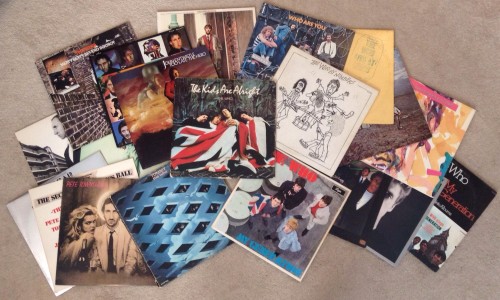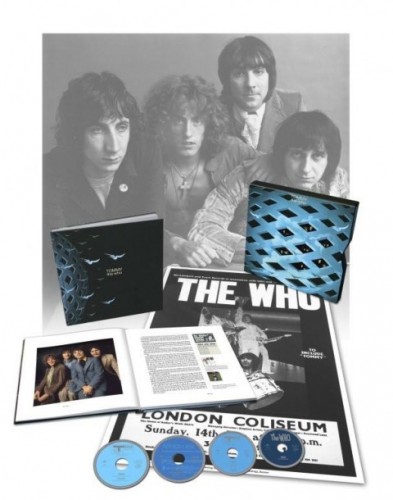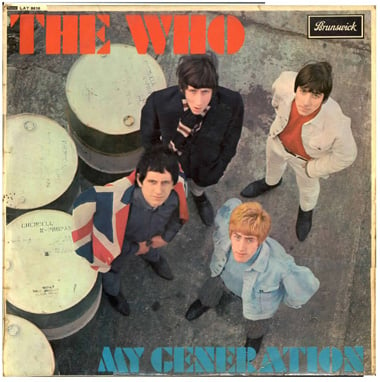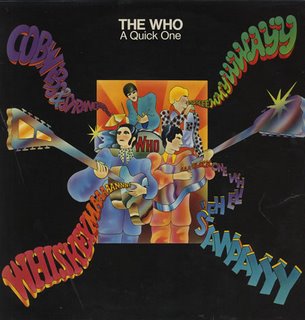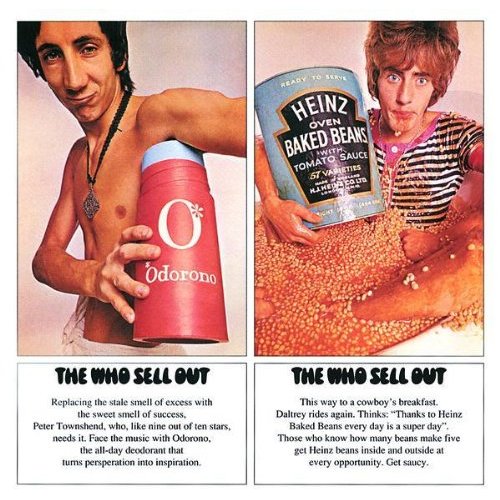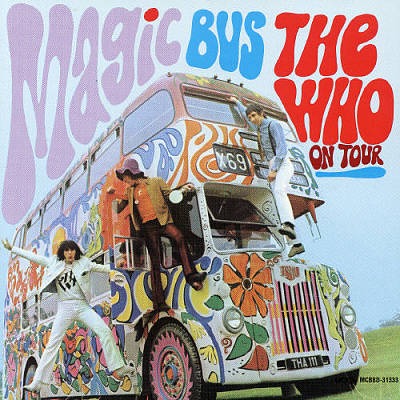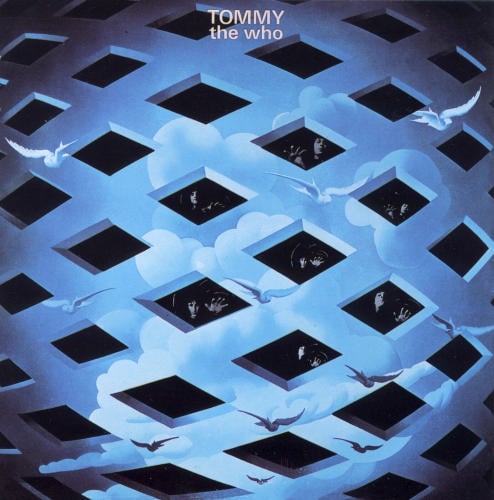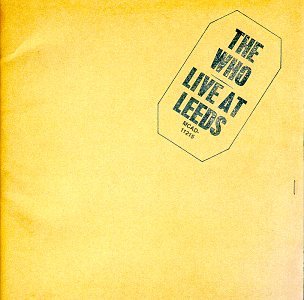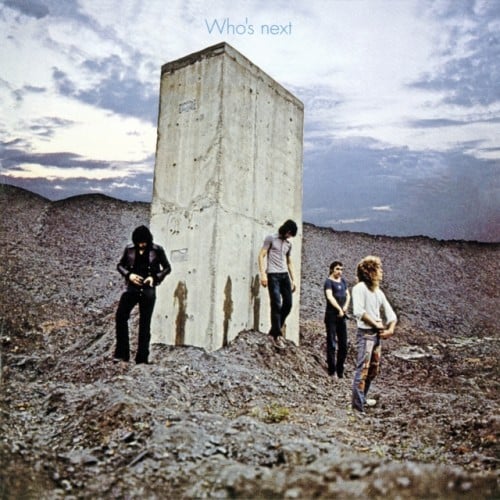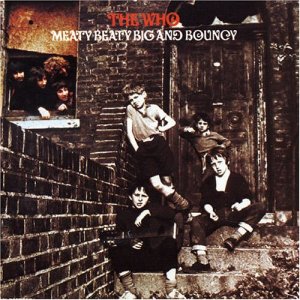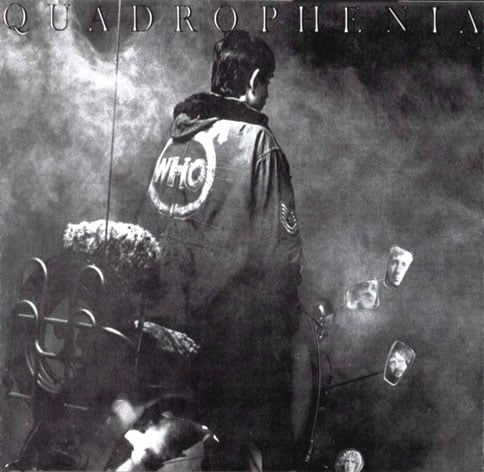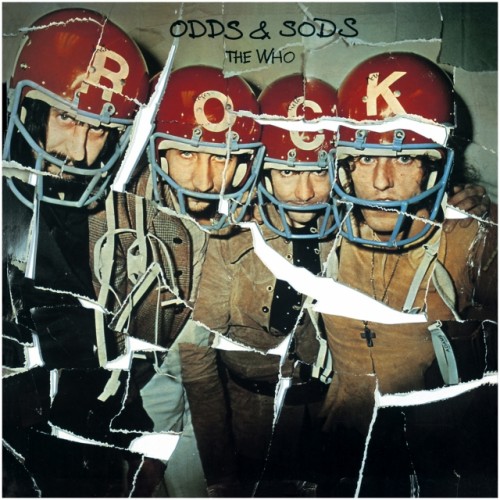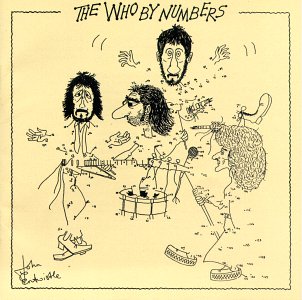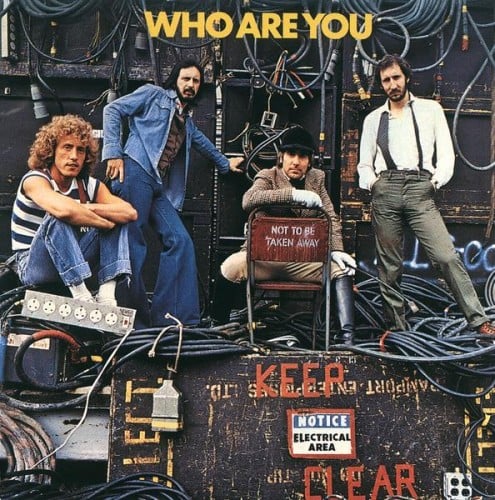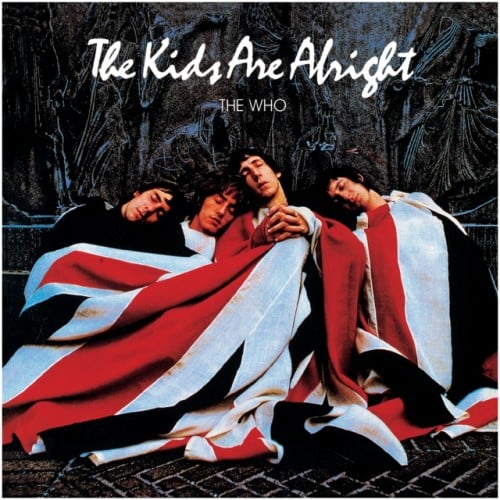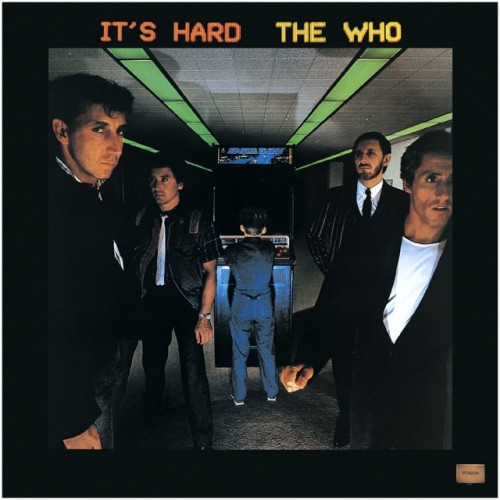Back in 2010, as The Beatles catalog was about to land on iTunes, I looked through all of their major releases and some solo works. This week we celebrate the release of ‘Tommy: Deluxe Edition’ from The Who, so I thought it would be fun to step through their catalog and look at all of the major releases.
As for the Tommy ‘Super Deluxe’ remastered version release, it was released November 11th on iTunes, and it will be available as a four-disc Super Deluxe Edition box set as well as a two CD Deluxe Edition and double vinyl edition. I’m sure I will look at that in more detail later in November.
But for now I’ll look at each of the major Who albums, along with a song choice and an opinion on how the record holds up today. For the song I will steer clear of the obvious hits and choose something you probably haven’t heard yet – but that is one of the better tracks on the album! I’m stopping with ‘It’s Hard’, which I consider the last real recording by the group. I will also choose from their solo careers to highlight worthy recordings.
Background – Why The Who Matter to Me
Looking back it is easy to pick out seeing ‘The Kids Are Alright’ in the theater as a pivotal moment in my musical life. I had been noodling around with guitar, taking lessons, and doing alright. But after walking out of the theater, I was electrified – and decided I was switching to the bass! The soundtrack to the movie was my first purchase, than the double album versions of My Generation & Magic Bus, and A Quick One & Sell Out. And so on until I had their entire major release discography on LP.
I call it a pivotal moment because I don’t think I would be listening to the abstract jazz I favor today without having started with The Who. I was already listening to rock music and playing guitar, but very quickly things changed. Listening to The Who led to The Yardbirds, which led to Jeff Beck’s Truth and Beck-Ola, and then to his 70s fusion stuff like Blow by Blow. This led to Stanley Clarke (Beck played on Clarke’s ‘Journey to Love’ album) then to Return to Forever, to Chick Corea’s current work, then to Miles Davis and Pat Metheny amongst many others.
As a result, even though it is music I seldom put on anymore, I can play a recording and there is a sense of ‘home’ to it, a feeling of history and a logical path between My Generation and Mary Halvorson that works for me – though not for anyone else! So as I look at these recordings I will be providing some insights at what mattered to me listening at the time as well as what I think now.
Another complicating thing is how the recordings have changed through the years. Most of the albums have been re-released with considerable extra material, and some such as ‘Live at Leeds’ and ‘Odds & Sods’ have seen wholesale alterations to the point that I had to consult my original LPs to remember the track listings. I have stuck to the original vinyl for my re-reviews.
Summary: It is hard to place many British Invasion records in proper context, at the time this album was released NO ONE had released such a powerful rock record. It bristles with raw energy, and the ferocious guitar and drums remain intense. ‘The Ox’ is still an amazing onslaught today! Most of the songs are Townshend originals at a time when the Rolling Stones were still mostly a covers band, and with a level of quality that hinted at the musical and lyrical directions Townshend would take later on. With songs like ‘Out in the Street’, ‘The Kids are Alright’, and the title track, this is NOT an immature debut.
Choice Track (and why): ‘Circles’ – while the lyrics are typical ‘broken hearted since losing you’ fare, it is the shifting harmonies over the static root that convey the sense of loss and despair. While not as advanced harmonically as Zappa, Townshend would always produce musically interesting songs such as this.
How Does It Hold Up Today: – Youthful enthusiasm meets raw talent. The production values and blues piano backing on some tracks date it to the mid-60s, as do some of the lyrics and hooks. But it remains a very impressive and overlooked work by the band.
Summary: Apparently the contents of this album were a push from the group’s managers to have all members contribute songs. I can only guess that given the volatile nature of the band they didn’t want to rely just on Townshend in case he stormed off and didn’t return. The result is an uneven work that could easily be called ‘sophomore slump’. Some good stuff, some throwaways, and a cover.
Choice Track (and why): ‘Cobwebs and Strange’ – aside from being a drumming master class for the ages, it is just such an example of the total mayhem swirling through the band. I’ve always seen this as an evolution of The Ox.
How Does It Hold Up Today: – There are some good songs here – the classic Happy Jack, So Sad About Us, A Quick One, and Boris the Spider. But since you can get those tracks elsewhere, I’d call this a ‘for collectors’ release.
Summary: Sell Out is a concept album about a radio station, with commercials, jingles and so on. But beyond the gimmick is an amazing album that flows perfectly from song to song. There is the hit ‘I Can See For Miles’, but I have always preferred ‘I Can’t Reach You’ or some of the other songs. Rael is notable for being a ‘scratch pad’ for ideas for Tommy.
Choice Track (and why): ‘Sunrise’ – between the gorgeous melody and intimate production, this is one of those songs that really transports you. And it also allows Townshend to open up the harmonic structure with interesting chord choices and substitutions that are a reminder of why he is one of the great guitarists of rock.
How Does It Hold Up Today: – When you ask critics to name The Who’s masterpiece, THIS is now the album cited most often, because it has so much great material, and works well as a collection of pop songs and a more high-minded rock experiment.
Summary: I had no idea when I got it (as part of a double album with My Generation), but this is really just a collection of sorts. As with many bands at the time, US and UK albums often had a couple of different songs. This album is a US release with a couple of songs that hadn’t hit the US yet. And way too many re-runs from their earlier albums.
Choice Track (and why): ‘Pictures of Lily’ – while there are masturbation songs scattered throughout rock history, how many of them take it further and have the protagonist fall in love with the girl in the pictures and try to seek her out?
How Does It Hold Up Today: – Totally skippable … no longer even considered a major release.
Summary: This is one of those albums almost designed for backlash – it is pretentious (rock opera), ostentatious (double album), and runs against the counter-culture by rejecting much of the psychedelic mainstream of the time. There is perhaps too much filler, yet this is an amazingly focused project – there are more great songs on this than many bands manage in their entire careers.
Choice Track (and why): Underture – a vast instrumental performance that shows off so many of the key themes in a way that seems somewhat static yet never is – Moon and Townshend have constant interplay, with Moon turning in a truly orchestral performance that is rhythm, ornamentation and lead all at once – anyone who thinks Moon is just maniacal energy needs to listen to this again.
How Does It Hold Up Today: – Especially with the remasterings (looking forward to the newest one), you can really appreciate just what an amazing musical accomplishment this record is. In the lead-up to the new release I am hearing new appreciation for this recording, which is well deserved.
Summary: ‘The Greatest Live Rock Recording Ever’. That is how it was billed, and produced an amazing contrast to the acoustic-heavy Tommy. The Who were a notoriously loud and ferocious live band, and this album showed it all – even old songs were incredibly reshaped and powerful.
Choice Track (and why): ‘Summertime Blues’ – I liked the original, and the Blue Cheer cover … but this is the definitive version.
How Does It Hold Up Today: – In this era of heavily produced music, watching live performances and award shows is a reminder of the lost art of the truly awe-inspiring live performance. My kids could feel the energy as I played this in the car. It remains a vital live rock milestone.
Summary: This remains the most popular Who album and their definitive legacy recording. Layered in synthesizers and with tremendous studio production values, Who’s Next provides perfect linkage between Tommy and Quadrophenia. The songs are all high quality, the recording impeccable, and the musicians at their peak.
Choice Track (and why): Bargain – the combination of some of their hardest rocking studio riffs with with an interesting structure and driving beat make this a classic.
How Does It Hold Up Today: – Timeless quality shines through … although a few songs have become overplayed through countless CSI seasons and spinoffs!
Summary: This is the first official compilation album with no new material, and does a great job of pulling together the band’s singles – some of which never made it to albums. This album starts with their first single ‘I Can’t Explain’ and brings us right up to 1971 with ‘The Seeker’.
Choice Track (and why): Substitute – I prefer the simple and direct version to the Live at Leeds one because the understated power here is more in keeping with the theme of the song.
How Does It Hold Up Today: – Most of these songs get broad radio play, so as an easy way to grab a bunch of their most popular tunes this works well (though I’m sure there are better collections available).
Summary: After The Who Sell Out this is my favorite album by the band, as it takes the ‘top-bottom’ interplay of Tommy and adds some incredible extended bass work by Entwistle, and loads more piano and synth work from Townshend. There are transitional songs, but nothing I would call ‘filler’ – even the title track is a powerful instrumental overture that ties together the themes presented throughout the two-disc event … and by the end of Love Reign O’er me you are just exhausted.
Choice Track (and why): The Punk and the Godfather – raw power from all angles, in a song about a kid dealing with challenges growing up, but also about all people feeling powerless in the struggles of society.
How Does It Hold Up Today: – I felt Entwistle ruined the mix when he did the movie soundtrack release in 1979, but for the 2011 ‘super deluxe’ edition Townshend did a masterful job of getting things just right. What is it all about beyond teen angst? Who knows … and who cares?
Summary: Another compilation, this time a ‘rarities and out-takes’ collection. It is a fun album that is hard to recommend as a stand-alone to anyone but a collector. There are some fun songs, a glimpse at ‘Lifehouse’, but generally this feels like ‘other stuff Pete was noodling with in the studio’.
Choice Track (and why): Glow Girl – aside from having some Tommy themes, this 1967 paranoid death fantasy song is another great use by Townshend of expanded harmonic structures and suspending complex changes over a simple structure.
How Does It Hold Up Today: – Most of the songs have been absorbed into their rightful places as ‘bonus tracks’ on other remastered collections and reissues. This is another throwaway.
Summary: The Who By Numbers is a total mess, yet a pretty solid album in spite of it all! The big hit was a throwaway joke song that nearly wasn’t recorded at all, and the album has some of the most introspective lyrics outside of folk music, with Townshend’s tales sung by Daltrey. It is uneven but mostly quite good.
Choice Track (and why): ‘Blue Red & Gray’ – in the same vein as Sunrise, this song tells of triumph and hope and love. It is deeply personal and intimate with just voice and banjo, yet builds power through horns in the background that evolve over time.
How Does It Hold Up Today: – I would call this album a 50/50 in terms of aging – some of it feels old and schmaltzy, while other songs are powerful and timeless. Success Story remains hilarious, just like so many Entwistle songs.
Summary: I did a track-by-track review of this already, but the bottom line is that the last album with Keith Moon was the most uneven since ‘A Quick One’. Townshend continued to change his writing style to more introspective lyrics dealing with music and the role of the rock star a decade after the 60s zeitgeist … and Daltrey wanted to keep singing arena rock. This makes for a few cringe-worthy moments. Yet this album has some of Townshend’s best guitar work and most interesting compositions. Entwistle’s role has changed subtly, and listening in retrospect it is clear that is due to the weakness evident in Moon’s playing.
Choice Track (and why): ‘Music Must Change’ – Pete Townshend is generally regarded as one of the great rock guitarists but never at the top with the true ‘lead’ guitarists. The reason is simple – extended solos are not his style (or forte) and that is the ultimate requirement of being a ‘guitar god’. Yet this song shows why he has been a driving force in rock music for so long: complex chord substitutions, interesting lines with genuine musical value, and a song structure that is both subtle and deep.
How Does It Hold Up Today: – While this album doesn’t get the radio play of Who’s Next, it does show up a fair amount on rock radio, and holds up very well compared to so many prog-rock recordings of the same era. Definitely not the best recording from the group, but one I would never drop from my collection.
Summary: This is an obvious favorite for me given the influence of the movie on my love of music, but it remains one I thoroughly enjoy. There is some amazing stuff here – ‘See Me, Feel Me’ from Woodstock builds slowly in tempo and power, and my older son (the rap fan) was listening to it almost non-stop for a week. Sparks (also from Woodstock) highlights the guitar/drum interplay; Anyway, Anyhow, Anywhere shows just how much raw power the band projected at that early stage.
Choice Track (and why): ‘A Quick One’ – at this point I never listen to the studio version, as this one is better in every way. It is more powerful, better put together, and shows what many highlight as the reason The Rolling Stones hid the tapes away for a long time.
How Does It Hold Up Today: – This is a great way to highlight the breadth of The Who in a way that shows their music and powerful live performances.
Summary: The fact is that Townshend and The Who struggled after the death of Keith Moon and the horrific events at the ‘general admission’ show in Cincinnati just as they started touring again … and then Townshend released Empty Glass, containing some excellent songs many thought would have been great Who songs. The result is a tight and tense album with solid performances and songwriting, but a clear shift from the ‘musically interesting’ songs on earlier albums. I don’t dislike this album as I did years ago, but it is nothing I would seek out.
Choice Track (and why): You Better You Bet – I love Entwistle’s pulsing post-disco bass, and this is one of the few songs where Daltrey’s delivery matches the lyrics. It remains a fun song.
How Does It Hold Up Today: – These songs still appear on the radio, but there is pretty much no essential listening here. Fortunately the music has aged well, but the production sounds a bit sterile to me.
Summary: At the time I preferred this album to Face Dances, but looking back it is hard to remember exactly why. The songs have minor musical pull, and the lyrics sound weak and tired and often cryptic.
Choice Track (and why): Eminence Front – in many ways tied to its era, the song also has a catchy hook and an infectious groove that allows you to forgive pretty much the whole album.
How Does It Hold Up Today: – The interesting thing is that while it isn’t a great album, songs like ‘Athena’, ‘Cry if you want’ and ‘Eminance Front’ all play very well on rock radio and stand along other classic rock songs quite well.
Solo Work: Keith Moon
Keith Moon might be one of the best rock drummers ever, but he was never either a singer or composer. His one traditional song on A Quick One was totally forgettable – and so it is no surprise that his single solo album is a trainwreck of colossal proportions. Not a single song to recommend.
Solo Work: Roger Daltrey
Daltrey was also not a composer, yet by hooking up with Leo Sayer was able to score the first solo hit by a Who member with ‘Giving it all away’. Daltrey’s records remind me of most of the The Beatles solo albums – a couple of good songs and mostly junk. My personal favorite album is McVicar, from a movie that was reviewed poorly and never crossed to the US. Here are a few recommended songs:
– ‘Giving it all away’ – from self-titled debut
– ‘Say It Ain’t So Joe’ – from One of the Boys
– ‘Free Me’ and ‘Without Your Love’ – from McVicar
– ‘After the Fire’ and ‘Under a Raging Moon’ – from Under a Raging Moon
Solo Work: John Entwistle
John Entwistle provided great compositional counterpoint to Pete Townshend. While he didn’t have the depth of skill, he could produce fierce rocking tunes with dark comic lyrics. He achieved some acclaim as a solo artists, not so much for popular hits as driving rock songs that catered to his following. Here are a few:
– ‘Heaven and Hell’ – from Smash Your Head Against the Wall (this was a favorite live Who song that never made it to an album)
– ‘I Feel Better’ – from his best album, Whistle Rymes
– ‘Dancing Master’ and ‘Too Late the Hero’ – from Too Late the Hero
Solo Work: Pete Townshend
Not surprisingly, Townshend has had the most successful solo career critically and commercially. After a couple of low-key ‘outlet projects in the 70s’ he hit his stride as a solo artist … while still part of The Who. He was criticized for the success of Empty Glass, because some of the songs seemed like they would have worked as Who songs. Honestly, Empty Glass and All the Best Cowboys Have Chinese Eyes are better than anything The Who did after Keith Moon died, and both are recommended in whole, but here are a few more specific recommendations:
– ‘Rough Boys’, ‘Let My Love Open The Door’, ‘Jools and Jim’, ‘A Little is Enough’, and ‘Empty Glass’ – from Empty Glass
– ‘The Sea Refuses No River’ and ‘Slit Skirts’ – from All the Best Cowboys Have Chinese Eyes
– ‘Melancholia’ – from Scoop, which is a lost gem of a demo song for ‘Sell Out’
– ‘Face the Face’ and ‘Give Blood’ – from White City
Conclusion
As the old saying goes you cannot hide your roots, and whatever avant-garde path my music tastes have taken me ultimately leads back to The Who. I found it interesting listening to their catalog again after so long away from it all – the strengths and weaknesses were cast in my starker contrast.
I enjoyed riding with my boys highlighting certain things, such as asking ‘who is keeping time’ as Sparks played, and them realizing that it was the bass player, and that the drums and guitar was playing rhythmic and melodic counterpoint … some of it improvised on stage at Woodstock in front of a half-million people!
I also appreciate My Generation more than I did, but at the same time can more easily toss aside A Quick One, Magic Bus, Odds & Sods and the last couple of records. Sell Out remains my favorite, with Quadrophenia and Tommy following and The Kids Are Alright soundtrack a great ‘go to’ for amazing live versions of songs … and a fun movie as well.

